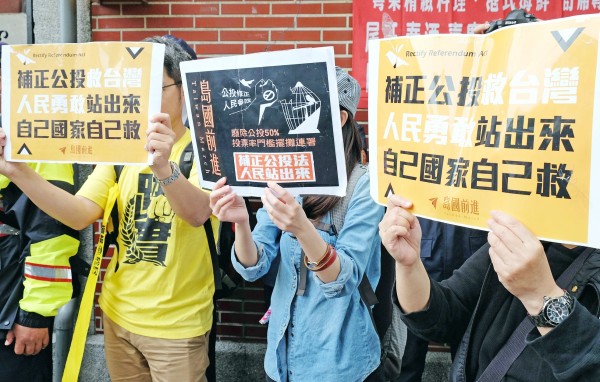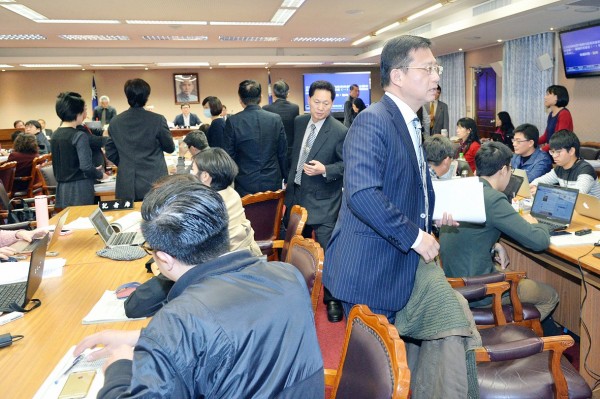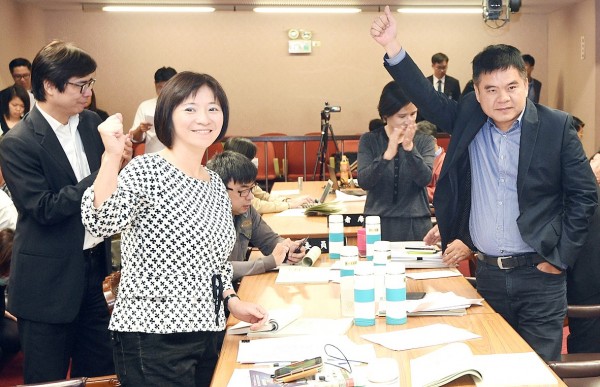《TAIPEI TIMES 焦點》 DPP vote to reform Referendum Act

Taiwan March members hold placards reading “correct the referendum law” as they demonstrate outside the legislature in Taipei yesterday. Photo: AFP
‘FEELING THREATENED’: The KMT legislative caucus said its members walked out of the meeting because of what they called unreasonable negotiation methods by the DPP
By Lii Wen / Staff reporter
Legislative deliberation on reform to the Referendum Act (公民投票法) yesterday came to a standstill after Chinese Nationalist Party (KMT) legislators withdrew from a meeting of the legislature’s Internal Administration Committee at about midday.
In the absence of the KMT caucus, their Democratic Progressive Party (DPP) counterparts unanimously passed a motion to lower the threshold of first-phase petitions for referendums to require signatures from just 0.01 percent of the electorate — or about 1,800 people.
Currently, referendums can be launched by members of the general public through a process that involves two successive petitions, a first-phase petition that requires the support of 0.5 percent of the electorate, followed by a second-phase petition that requires signatures from 5 percent.
As there are about 18 million eligible voters in the nation, the two successive petitions currently require about 90,000 and 900,000 signatures respectively.
A 50 percent turnout of eligible voters is also required for a referendum to be declared legitimate, a threshold which critics say is almost unattainable.
The KMT legislative caucus said that its members walked out of the meeting in protest against what they said were unreasonable negotiation methods adopted by the DPP.
The KMT added that it refused to continue reviewing the act while “feeling threatened” by demonstrators outside the Legislative Yuan compound, referring to dozens of protesters who voiced their demands through loudspeakers.
Led by Taiwan March cofounder Chen Wei-ting (陳為廷), who played a central role in the Sunflower movement protests last year, the protesters said that the turnout threshold for referendums should be abolished.
The meeting began smoothly in the morning, but tensions quickly escalated after Executive Yuan Secretary-General Chien Tai-lang (簡太郎) said that the government would refuse to accept any adjustments to the current 50 percent turnout threshold for general referendums.
Although Chien said the government would agree to lower the threshold for the first-phase petition to 0.3 percent — about 54,000 signatures — he remained opposed to changes to the second-phase petition or to the voter turnout threshold.
His remarks sparked outrage among DPP legislators, who said that the government clearly lacked sincerity in promoting reforms to the act.
“We have engaged in so much talk about the first-phase petition because it is an initial threshold that would affect other regulations; if we already know what the results will be in the end, our previous discussions are rendered meaningless,” DPP Legislator Pasuya Yao (姚文智) said.
KMT legislators expressed dissatisfaction after their DPP counterparts demanded that they take a stance on the issue, saying that discussions about the second-phase petition requirements or the voter turnout threshold should be addressed at future meetings.
“Nobody forces an opposing party to reveal their bottom line during negotiations,” KMT Legislator Wu Yu-sheng (吳育昇) told reporters at the KMT legislative caucus office in the afternoon.
He added that the KMT has expressed goodwill toward enacting reforms to the act, as KMT legislators have suggested that the threshold for first-phase petitions could be lowered to 0.25 percent.
Wu accused protesters from Taiwan March of disrupting the legislative process and of “personally threatening” the safety of KMT Legislator Chang Ching-chung (張慶忠) during a meeting two weeks ago.
“If lowering the threshold must be done exactly in accordance with your wishes, well I am sorry, but you must get elected as legislators yourselves before joining discussions with us,” Wu said.
新聞來源:TAIPEI TIMES

Chinese Nationalist Party (KMT) lawmakers yesterday walk out of the meeting as the legislature’s Internal Administration Committee reviews an amendment to the Referendum Act to lower the threshold for referendum proposals. Photo: CNA

Legislators raise their fists in victory as the legislature’s Internal Administration Committee passed the first reading of an amendment to the Referendum Act to lower the threshold for referendum proposals after Chinese Nationalist Party (KMT) lawmakers walked out of the meeting. Photo: Wang Min-wei, Taipei Times














